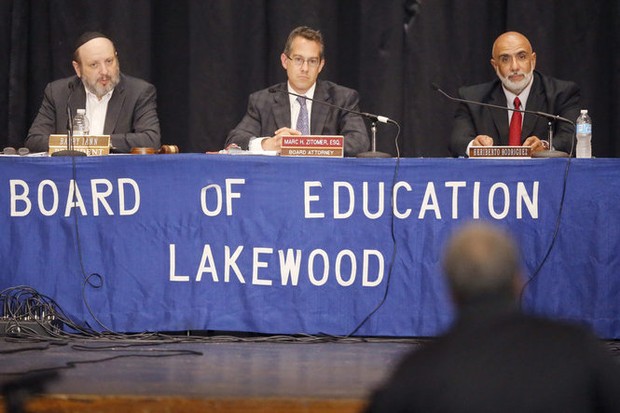
The district's former grants director, a Jewish woman, said she was reassigned after raising concerns over special education assessments and because she was not Orthodox.
A federal lawsuit by an employee of the financially troubled Lakewood Board of Education charges she was fired in retaliation for trying to expose excessive and improper special education referrals for yeshiva students, and because she was not Orthodox.
“It appears that if one is not Orthodox Jewish, like the majority of the LBOE Board Members, and is not committed to diverting public school funds to benefit the local religious schools, that individual does not get to remain as an employee in the Lakewood School District,” states the lawsuit, which was filed Feb. 14 following a formal notice warning of the suit in May.
The suit is by Tobree Mostel, who had been hired by the board in 2011 to administer grants involving private school students referred to special education programs based on needs assessments performed by outside experts. Mostel is Jewish but not Orthodox, the suit says.
About 95 percent of those assessments, most of which involve Orthodox children enrolled privately run Jewish schools, were conducted by a Lakewood firm known as On Track Resources, which was founded in 2008 and performs the assessments under a contract with the district, the suit states.
Lakewood’s population of just over 100,000 is about 70 percent Orthodox, a tightly knit community whose rapid growth and strictly observed religious and cultural traditions have prompted fear and resentment among some non-Orthodox residents.
Officials say virtually all of the township’s Orthodox children attend yeshivas, though for years a majority of school board members have been Orthodox, including six of the current nine board members.
On Track was named among several defendants in the suit, along with the board’s former president, Barry Iann, its former attorney, Marc Zitomer, as well as a current board member, Isaac Zlatkin, plus unidentified individuals and businesses.
The defendants either denied the allegations, did not respond to requests for comment, or could not be reached.
According to the complaint, Mostel was hired in the midst of an audit of the district by the state Department of Education, which turned up what the suit referred to as several instances of “misuse of funds.”
The suit says Mostel began working to address questionable and unethical practices by On Track, including assessments made by staffers who had a vested interest in maximizing special education referrals, and the use of cut-and-pasting in composing assessment reports that, by nature, should have been tailored for each student.
It was in 2016, after Mostel said she raised her concerns about the abuses, that she became the victim of retaliation by Iann, Zlatkin and Zitomer, the suit states.
“Almost immediately, false accusations and bogus complaints started materializing,” one in which she was publicly accused of watching movies at work, the suit states.
Mostel was reassigned, and her duties involving special education grants were given to an Orthodox employee, according to the suit. She was suspended from her district job at a meeting on Feb. 15, 2017, and then, the suit states, “during the week of May 8, 2017, the lBOE attempted to terminate Ms. Mostel by not renewing her contract.”
A spokesperson for Zitomer’s firm, Schenk, Price, Smith & King, issued a statement insisting, “There is no merit to the lawsuit and it will be vigorously defended.”
Neither On Track nor Zlatkin responded to requests for comment. The school board’s current attorney, Michael Inzelbuch, also did not respond.
Iann resigned last summer without giving a reason, though colleagues blamed stress from years of budget deficits filled by loans and special appropriations. He could not be reached.
The lawsuit comes as Lakewood school officials project yet another annual deficit they attribute to the failure of New Jersey’s state education aid formula to account for the large number of students enrolled in yeshivas whose special education and busing costs must be paid by the school district. Last year, the district planned to lay off more than 100 public school teachers and eliminate much of the high school sports program before special state appropriations and loans helped close a budget gap of $14.7 million.
A mandate that districts fund those private school costs applies statewide. But district officials say the mandate’s impact on Lakewood is unique because of the district’s singular demographics: 6,100 mostly Hispanic and black students attending eight pre-K-12 public schools; and 30,000 students attending Lakewood’s 118 privately run yeshivas.
Districts do receive state aid for transportation and special education of all students, public and private, but district officials say it’s not enough, and that Lakewood is grossly underfunded because a central component of any district’s state aid is based on the number of students who attend the public schools.
Mostel’s complaint notes that hers is just one of just several suits filed against the district by employees who say they were victims of retaliation for seeking to expose wrongdoing. Those suits were filed by the same lawyer who represents Mostel, Patrick J. Whelan of Trenton. Whelan’s office said he was not available to comment.
The Lakewood suit is in contrast to other recent anti-discrimination battles involving the Orthodox Jewish community that have been playing out in neighboring Jackson Township and three towns in northern New Jersey.
Last fall, Orthodox plaintiffs filed suits against Jackson, Mahwah, Upper Saddle River and Montville, charging that municipal officials in each of those towns tried to block creation of a local eruv, an demarcated area permitting activities otherwise prohibited by Jewish law on the sabbath and Yom Kippur.
In Jackson, where the council had also approved an ordinance that would ban yeshiva dormitories, township officials in December authorized their lawyer to negotiate a compromise with the plaintiffs. And last month, Mahwah rescinded an ordinance cited in its case after the state attorney general’s office joined in the suit with the plaintiffs.
Steve Strunsky may be reached at sstrunsky@njadvancemedia.com. Follow him on Twitter @SteveStrunsky. Find NJ.com on Facebook.
http://www.nj.com/ocean/index.ssf/2018/02/discrimination_suit_non-orthodox_lakewood_employee.html